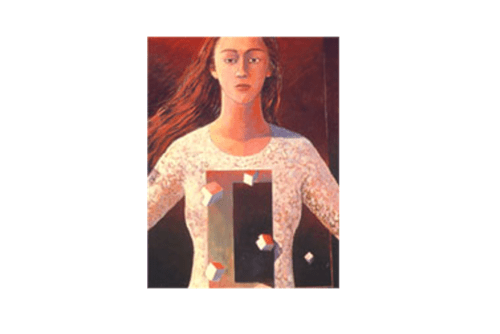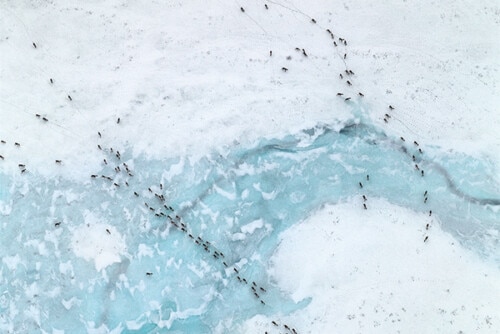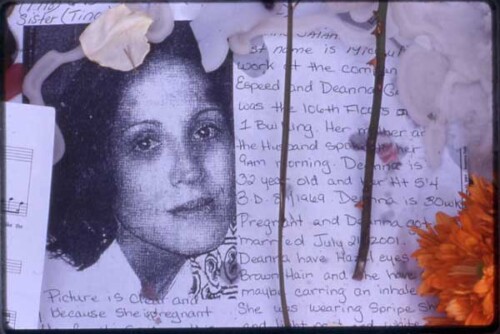In Sources of the Self: The Making of Modern Identity (Cambridge: Harvard University, 1989) Charles Taylor introduces the concept of identity as follows:
…the question is often spontaneously phrased by people in the form: Who am I? But this can’t necessarily be answered by giving name and genealogy. What does answer this question for us is an understanding of what is of crucial importance to us. To know who I am is a species of knowing where I stand. My identity is defined by the commitments and identifications which provide the frame or horizon within which I can try to determine from case to case what is good, or valuable, or what ought to be done, or what I endorse or oppose. In other words, it is the horizon within which I am capable of taking a stand.
It is about this horizon that I wish to speak – about exile and the problem of identity in exile. I will speak from the vantage point of my own personal experience as a woman in exile and also on the basis of the experiences of the women I worked with in preparation of the book Women in Exile. What I will share with you is not theoretical material or sociological study, but rather first hand observations about how twelve women, thirteen including myself, came to take refuge in the United States and construct a new composite self based on their old and new circumstances. These women, whose stories appear in the book Women in Exile and who represent a wide variety of cultures, religions, classes, socio-economic backgrounds and geographic locations, each had an identity within her culture and society; each woman changed over time, came into conflict not only with the traditional values and mores, but also with modern patriarchal structures, and, finally, was forced to choose exile because of abrupt and violent changes in her country.
My own odyssey began in 1978. I had come to the United States in October of that year in order to finalize the negotiations with the United Nations to set up the International Research and Training Institute for the Advancement of Women (INSTRAW) in Tehran. I was then the secretary general of the Women’s Organization of Iran. I had spent years working for women’s rights on the national level and had dreamed of helping build this international center in order to collect documentation and information on and about women across the world. In the midst of the long daily negotiations with the UN lawyers meant to ensure the autonomy and independence of the center and its freedom from control both by the host government and by the UN bureaucracy, I received a fateful call from my husband in Iran, telling me that the political situation had deteriorated in Iran. The fundamentalists were gaining ground. The government was scapegoating controversial figures and as the most visible representative of the women’s movement in the country, I would be arrested on arrival. The Center, so nearly realized, suddenly became unimaginable. The fundamentalist tide was sweeping away the concept of such a research center together with the Women’s Organization that was to be its liaison in the host country.
My life was thus abruptly severed from its roots. Everything that had given me a sense of who I was, my country, my home, my job, my colleagues, my friends, my language was suddenly distanced, ruptured, lost to me. I was an exile. Not only was my relationship with my country changed, but my relationship with the country in which I was a temporary visitor was completely altered. But the severest disruption was in my self-perception, my sense of who I was.
The sudden loss of identity started me on a search for the sources of my “self”. This journey was to take me to a deeper layer of feelings, thoughts, and experiences that I had not known before, and on which, now, I was to build a new identity.
One’s first reaction to being forced into exile resembles one’s reaction to sudden death of a loved one – shock and disbelief followed by denial of what has occurred. At first, one cannot accept what has happened. Then, slowly, the process of mourning begins, which leads to eventual healing and regeneration. I was helped through this process by sharing with a group of women who like myself had been forced into exile our mutual experiences, seeking to write a collective biography of exile.
Through its disruption of the given and accepted, the exile experience brings into focus the sources on which the self is composed and structured. I suggest that the shared experience of women across cultures can help define how women are directed toward a particular formulation of their identity. I would like to spend the time I have with you today to trace a few common threads that bind our thirteen lives together.
Our earliest and most basic experience is how as children and young adults we each experienced our culture’s ways of limiting the boundaries of our lives, assigning a special space to us, and segregating us from the rest of society. From Russia to Vietnam, from Afghanistan to Chile, societies with entirely different cultural and religious backgrounds, are very similar in what they think the woman’s role should be. Tatyana Mamonova of Russia describes how she conducted an ongoing battle with her father who forced her to work in the kitchen while he allowed her brother to play. Hala Jabbour of Palestine tells how she waited ruefully for her aunt to allow her to respond to the question put to her brother “what will you be when you grow up?” only to be told that for her there was no choice but to be a wife and a mother.
As a child in China, they bound Ge Yang’s feet tightly every night using many yards of fabric. They explained to her that she must have “three inch golden lotus” feet. In Sudan, a three year old Fatima was circumcised during an elaborate ceremony.
In all twelve countries the dominant principle in the education and training of women is that of limiting her physical mobility, her sexuality, her time and how she is to spend it and her options for developing an identity.
Ho Tran of Vietnam faced a double encroachment on her freedom to be what she wanted to be. She was forced by her French educators not only to adopt a French name, but to internalize French cultural concepts. She was so saturated with French values that even the setting for her dream of the ideal family life became a French dream. She imagined “a snowy winter evening, an older woman sitting by a fire place in a rocking chair, knitting.” She says: “Although I had never seen snow in my life, my image of peace and contentment and security required French scenery.” Her dream of helping humanity became working for the poor in Africa – a French dream, she realized later. Her own country needed her as much as Africa. Her education as a Vietnamese girl child involved learning the three cardinal rules “when a daughter, obey thy father, when married, obey thy husband; when widowed, obey thy son.” And the four maxims for women: Cong – engage in diligent work; dung – maintain a neat appearance; ngon – use appropriate language and voice; hanh – sustain proper moral behavior. She says “as a Vietnamese girl you were taught how to set the meal and how to eat it. But before you learned how to eat, you had to find out who you were. All your actions derived their rightness from your knowledge of your place within the hierarchy. As a woman you learned to walk with deliberation – never too fast. You learned how to speak. You learned how to wrap and unwrap things. It was important to avoid seeming impulsive and hurried. You learned to sit properly with your legs tucked under you and the tunic brought forward and draped and folded over your knees.” Her training resembles very much the training of Sima Wali of Afghanistan who says “I was taught in school, especially in religious classes, to observe limits, to accept authority, and to subdue curiosity. I was truly oppressed by my education. I was terrified to overstep the boundaries set for me as a young person, a student, and a woman.”
The relationship between men and women is remarkably similar across the various cultures. Maria Teresa of El Salvador a working woman with one year of schooling learns to become a political activist because of her husband’s work as a union organizer which leads to his arrest. Her first efforts are centered on getting him released. But once he is released from prison, he wants her back in her prescribed role. She says “my husband had a hard time adjusting to my new role. He was grateful that I had worked for his release, but he wanted me back in the house. He wanted my life to return to what he considered normal – cooking, washing, ironing, and taking care of the household.” He finally agrees for her to return to her political activities when she threatens to leave him if he continues to object. But he does not discuss politics with her nor does he allow her to share her plans and activities. They meet at demonstrations by chance.
Hala, living first in Lebanon after being exiled from Palestine takes over a family business only to learn that the Arab men who have business with her company prefer talking to her male assistant rather than to her, because she is a woman.
Issues related to marriage, fidelity, polygyny are strangely similar across religions. Florence of Malawi says that her grandfather, a Christian, had many wives. “When religion interfered with his marital plans, my grandfather put aside religion” she said. Ge Yang of China, Ngoc Ho of Vietnam, and Maria Teresa of El Salvador all talk about their father’s infidelity. Ge describes the institution of second wife and how her uncle’s wife, being childless, contracted her maid to be the second wife of her husband so that she would give him what was his due in these cases, yet save face for herself.
Twelve diverse cultures, all traditional, all politically repressive, nevertheless offer men a wide range of choices of identity and a great number of models for becoming. They all limit women’s movements, behavior, sexuality, and options for life models. There are in fact no options except the traditional role of wife-mother. They all shape a woman’s self image through a detailed and well taught out educational process working within a set value system where a woman’s worth is judged in relation to her usefulness to the man.
Exile breaks the cultural shell within which the women’s identities have been formed and in relation to which they function. At the outset there is a period when the old values are no longer in operation and the new cultural context is not yet explored and accepted. This is a period of relative freedom – freedom which comes from absence of accepted rules, from chaos. An exile’s first experiences relate to being alien and unfamiliar with the new social and cultural norms. In this context, she begins with a clean slate in a new society and reacts not as a female but as a foreigner. Lack of recognizable gender-related signals allow her freedom to explore expanded horizons of behavior. There is usually a dual adjustment – one to the strange and hostile world outside and one to the internal family related existence, which also has hostile overtones because of the unfamiliar norms quickly imposed on life situations.
Because women are the ones who deal with the everyday survival and continuance of life, they are the ones who are more connected to the social context. They are the ones who have to buy and prepare food, deal with schools and teachers, clothe children and send them to various functions, deal with other parents and children. They are the ones who must quickly learn to function in the new setting. Not being the masters in the old society, they have had less at stake in the old and have more to gain in the new culture. They have much to share with the women of the new society in the care and management of a household and children. They begin to adjust more quickly and smoothly. In the interim between loss of old structures and assimilation of the new, they enjoy an exceptional period of freedom to test, to experiment, to choose and a whole host of new options for molding their new identity.
In fact, the need to form a new self is the first and most pressing item on the agenda as they begin to interact with the new culture. In order to communicate with others, they must know who they are. This need is symbolized by a recurrent dream that Marjorie Agosín of Chile describes. “I am in my childhood home, walking toward a door. I open the door looking for someone, and it’s me that I see on the other side. I go looking for someone that I loved and I find myself there – a younger me.” Sima Wali of Afghanistan describes the loss of roots leading to a loss of identity in this way: “My companions didn’t know where Afghanistan was and cared very little what happened to it. Here was a country with which my selfhood was closely connected and they didn’t even know where it was… I went to a store to shop and somebody would ask for my ID. I had never been asked that in all my life. It was as if I were not trusted – as if I had to prove who and what I was.”
After the initial shock and disbelief, we all worked frantically to make sense out of ourselves and our new lives. We changed in order to adjust and struggled to understand and come to terms with the changed self and the reaction of our loved ones to our newly constructed identity. Each of us undertook a whole new set of activities and experiences. Sima married a man from another religion, race, and country, thinking to adjust she must cut with the past. Hala contemplated divorce, rejected the idea because of her children, worked with Palestinian and Israeli women for peace in Palestine. Marjorie immersed herself in the Spanish language, thinking of it as her true home, becoming a poet as a way of surviving. Alicia talked obsessively about her experiences of torture and imprisonment. Finally she was able to get her graduate degree and publish a number of books of prose and poetry. Tatyana launched a feminist journal. Maria Teresa traveled on behalf of Comadres to bring international attention to the disappeared in Latin America.
Each of us learned that we can neither forget the past nor deny it. We can neither accept American culture nor reject it. That home is neither there nor here. We belong everywhere and nowhere. On good days we consider ourselves citizens of the world, love the relative freedom and independence we enjoy in America, yet relish the old cultural roots we continue to nourish and maintain in exile – the music, literature, food, ceremonies and celebrations and old connections. On bad days we feel paranoid and alien and alienated. We do not understand. Always we remain unsure of the right thing to do, the expected thing to say. We cannot forget that someone has stripped us of the right to go home – that someone has decided to take away our citizenship, our status, our country and our sense of self. The loss of the choice to remain or to leave is what it is all about. The effects of exile remain with us. Samnang Wu of Cambodia says: “Inside, I am damaged. Like a broken vase that has been mended, I will never be whole and healthy again.” Alicia says: “The effects of exile stay with you all of your life. They are like things hidden in a closet. They suddenly jump out at you, like jack-in-the-box toys.”
At some point however, we each came to accept our new lives and our new selves and to take joy in our expanded horizons. Marjorie Agosín of Chile says “Exile became a positive thing for me. I wrote profusely. I wanted to let people in the United States know what it is like for those who cannot return to their homes, for those who are stopped at airports, for those who live in terror of their government. I wrote about the emotions of exile, about the grief in not hearing the language, not seeing the landscape. I explained how I long to walk on the streets of my city. I described how I miss not having to spell my name, not being asked where I am from-how I miss not being there. Writing brings me closer to the language which is my inner self, my reality, my identity. I think life in exile has sharpened my feeling for and my appreciation of the Spanish language.” Hala of Palestine says: “I felt free as I have never felt before. I could be what I wanted to be, say what I wanted to say, without fear, without endangering my children, my reputation, or the honor of my family and without the guilt that presses down upon a woman and a mother in my own culture. My feminism flowered – that is exactly how I feel – like a large, healthy plant which is given water and air and sun until it blooms. I began to feel unencumbered.”
Ngoc Ho of Vietnam says: “Now after years of trying to adjust to life in exile, I have begun to feel comfortable with who I am. I enjoy both the Vietnamese community and the American community. Once you have your values clearly thought out, those who come to you come accepting what you are. With my husband I have a relationship based on respect. If we had lived in Vietnam, he would have had a less tolerant role and he would have taken a more dominant position in our decision-making. He now sees me more as a person than just a wife – someone with an independent set of values. I don’t know what I would’ve been like had I stayed in Vietnam. But I think that I have changed for the better. The positive thing about being in America is that I can realize my potential as a woman. Doors are open to women here that are closed in my country. I feel comfortable with myself. Perhaps more, now that I have had a chance to rethink my identity and arrive at a composite self, made of my own Vietnamese self and my American cultural acquisitions.”
Azar says: “In exile I have learned and grown and found a new identity for myself. I have found great faith in my own capacity to transcend almost any hardship and to survive. I have seen my women friends become the pillars that hold up the other members of their families, lending support to their husband’s search for a new identity while restructuring their own. I have had the loneliness of making all of life’s decisions on my own, the experience has hardened me. But it has also made me self-reliant. I have grown as a person. I have searched within myself for every ounce of initiative, every resource, every strength in order to empower myself not only to survive but to become whole for my children. I am proud of what I have been able to accomplish.”
For many of the women I worked with, there came a time when the conditions in their country changed, new governments and new circumstances made it possible for them to return to their home. Only then did they realize the permanence of exile. The home they had dreamed of had changed. They themselves had changed even more drastically. The sense of oneness with and comfortable comprehension of the cultural context was no longer there. They looked at their country from the outside as a stranger. Like long-ago childhood memories, they belonged to a time past and gone, never to be recaptured in reality. Alicia describes this feeling:
It is difficult to express my feelings on my return. I was aware that my fellow passengers, Argentineans who lived in the US were alien to my experiences. When we landed they were playing a tango on the loudspeaker at the airport. that’s our national music. I thought it sounded like the soundtrack for a movie. I felt like crying when I first saw the earth of Argentina. I wanted to kneel and kiss the ground, but then I thought no, it was dirty, and also nobody around me would understand. My daughter would think me crazy. When I went back again disillusion set in. I had changed. I looked at my homeland from the outside, as an alien. The country’s economic problems were overwhelming. The trials of the generals who had commanded and ordered such things as my ordeals ended with their release. I was frustrated to see that after all we had endured, justice was not served. I felt a great rage. On my return to the US I had a stronger feeling of alienation. I now knew that I was no longer really an exile. I had lost the sense of home I had felt in Argentina in my childhood and early youth. Seven years after my first arrival in the US and when I no longer had to stay, I finally landed in this country. It took me a while to be able to write about this experience. But when I did, I had finally transformed my life. I had changed from victim to witness. I felt empowered to work for change in my life and the life of others.
There are eighteen million refugees and twenty million displaced persons in the world today and the numbers are growing. The majority of these are women and children. Our thirteen stories are just a sample of what women endure, survive, and surpass. They show that even under the most turbulent and trying conditions there are those who will overcome. Our story is about hope.



